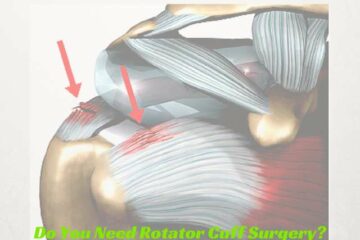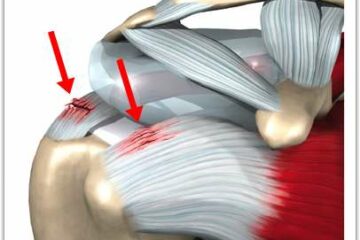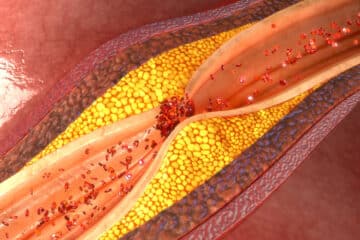
You have fallen, you can not move your arm, and you have been told that you have a rotator cuff tear. Do you need to consider surgery to repair your rotator cuff?
Types of Rotator Cuff Tears
In our first Expert Series post we explored the cause of rotator cuff tears. What explained that the majority of rotator cuff tears are due to degeneration or attrition of the rotator cuff. Simply put- your rotator cuff tendon simply wore out.
Alternatively, trauma, such as a fall, or an accident can also cause a rotator cuff tear. When it comes to managing patients with traumatic rotator cuff tears most Orthopedic Shoulder surgeons are in agreement. There is a significant difference in the management of acute traumatic tears of the rotator cuff, versus the more common degenerative or attritional tear that we see. As discussed in our last Expert Series post, the initial treatment of a small degenerative tear is nearly always non-surgical.
Do We Recommend Surgery for Traumatic Rotator Cuff Tears?
In this post, our experts will discuss their thoughts on the management of traumatic rotator cuff tears.
Marty Leland, MD: Website, Twitter, Facebook
This depends on the activity level of the patient, how much pain and weakness they have, how long has it been since the tear and if they are starting to see any improvement or are things staying the same or getting worse. Night pain is also a sign that a patient has a higher likelihood of needing surgery. Also, the larger and more retracted the tear, the more I worry that they will not get better unless they have surgery. If I have a patient in their early 40s that works in heavy labor with a traumatic rotator cuff tear that has not shown any signs of improvement in 4 weeks, I might get an MRI right away and then discuss arthroscopic surgery. However, if I have a 70 year old retired patient of low physical activity that tore their rotator cuff slipping on the ice, I definitely want to try a significant course of non-operative treatment before discussing surgery.
Jeffery Berg, MD: Website, Twitter
I always try to fit the treatment to the patient…not the patient to the treatment, so I don’t have absolute rules. If the patient is younger than 65 yo healthy and active, I will almost always recommend surgery. If they are older and active, I will also usually recommend surgery. In patients that are less healthy, older and/or less active, I will consider nonoperative treatment but counsel them that their symptoms are likely to persist, progress or, even if improved over the short-term, could recur in the future. At that time, the tear may not be repairable or if repairable, will likely have a poorer prognosis for healing.
Scott Slattery, MD: Website, Twitter
When an acute, traumatic rotator cuff tear occurs and creates a sudden loss of function, I generally recommend surgical treatment. Patients do not tolerate sudden, significant tears as well as the slow, progressive degenerative tears. Several studies have shown that the best results, with acute tears, occur if the tendon is repaired within three months of the injury.
Derek Ochiai, MD: Website, Twitter
For acute, traumatic rotator cuff tears, I would recommend surgery. Typically, these tears can be more extensive and retracted away from the bone, making non-surgical intervention less likely to be successful. Also, acute traumatic rotator cuff tears in patients over the age of 40 years old can occur in combination with shoulder dislocations. If a patient over 40 has shoulder pain following a shoulder dislocation, I would have a high index of suspicion for a rotator cuff tear.
If you are a healthy, active individual who has slipped, fallen or have been in an accident and you have suffered a traumatic tear of your rotator cuff then your surgeon is likely to recommend a repair to give you the best chance at having a pain free, strong shoulder.
Once again I would like to thank our experts for their contribution to your education on the management of rotator cuff tears and shoulder pain.












Thank you, we did not get past his primary care provider – though he did say he wanted to see what therapy would do. We do have good insurance so that is not the issue, something I realize figures into the decision part of the time.. His physical therapist recommended another orthopedic surgeon whose patients she had worked with in therapy for the same injury.
Elizabeth Moore
Seeking clarification. Surgery only recommended for traumatic tear if significant loss of function right away? I’m an active 50 year old who slipped and fell backwards onto a titled floor. Saw primary 12 days after and told no MRI without trying PT first. 4.5 weeks of PT have restored almost full range of motion with just slight discomfort – no pain medicine needed. No weakness. Still pain sleeping on that side so I don’t do that. If traumatic and PT seems to be doing the trick is there still a recommendation for surgery?
Ellen… There are many variables that go into the decision making about whether or not to have a rotator cuff repaired.
– size of the tear
– location of the tear
-acute (traumatic) vs. chronic (atraumatic)
– patient based quality of life complaints.
In my position I can only give information, I can not offer treatment recommendations. But the aforementioned variables and their effect on decision making can be reviewed with your surgeon to help you understand your options.
It will be two weeks tomorrow since I had a bike accident. I fell on my right shoulder with arm against body, not outstretched. Right clavicle was broken and has been in a sling. I have a deep ache in my shoulder and cannot lift my arm from my side more than a couple of inches. Could the shoulder pain and immobility be related to the broken clavicle or does there sound like there is more at play? I see an ortho in four days. Should I press for an MTI if there is no improvement in the pain and mobility by then? Thank you.
Each case is different Greg… some people can have injuries to both the rotator cuff and the clavicle, although that is usually rare.
When they examine you they should be able to determine if you need an Ultrasound or MRI to study the rotator cuff too.
Good Luck
I have a full thickness supraspinator tear with a 1.5cm retraction, no fatty infiltration, and a full thickness infraspinator tear with a 1.7cm retraction, no fatty infiltration, along with a 4cm superior larbral tear. All confirmed on Ultrasound, and MRI arthrogram. I have had 10 months of intense physio, and NSAID’s, with no improvement, – My night pain is probably the most debilitating as I am not sleeping for longer than 2 hours at a time. My husband does not want me to have surgery. Will I heal with out?
Thank you.
Probably not… that’s a large tear.
I am an active 54 year old woman. I was pulled off a golf cart by my dog in August (I know – don’t ask!) and landed on my shoulder. I had severe shoulder pain. I saw an orthopedic surgeon in October, who did x-rays to make sure that there were no breaks, and administered a cortisone shot. As I was uninsured until January 1, he suggested an MRI in early January if the shot/time/rest/NSAIDs did not work. I still have constant ache and very limited mobility.
I had an MRI done yesterday. 1. Extensively thickened and edematous joint capsule consistent with adhesive capsulitis. 2. Mild partial subscapularis tendon tear with partial longitudinal biceps tendon tear and partial medial subluxation of the long head biceps. I have a follow-up with my local ortho, and went ahead and scheduled an appt with a shoulder specialist at Duke.
Do these types of tears typically need surgical repair? Would just the arthroscopic repair fix all the issues that are listed on the MRI report? Or does the capsulitis and the subluxation of the LHB require different repairs?
Thanks so much!
The primary goal is to get your range of motion back. Surgery on an already stiff shoulder is not the best idea. In addition, your tears are not severe at all. Many people live long happy lives with those findings without surgery.
Most shoulder docs would agree that you should start with aggressive therapy to get the shoulder moving… and only consider surgery if your pain persists after a few months if therapy doesn’t alleviate your symptoms.
But please keep in mind… only you and your doctor can make that decision. Please understand that I post for educational purposes and can not offer treatment advice as a physician in this forum.
Good Luck